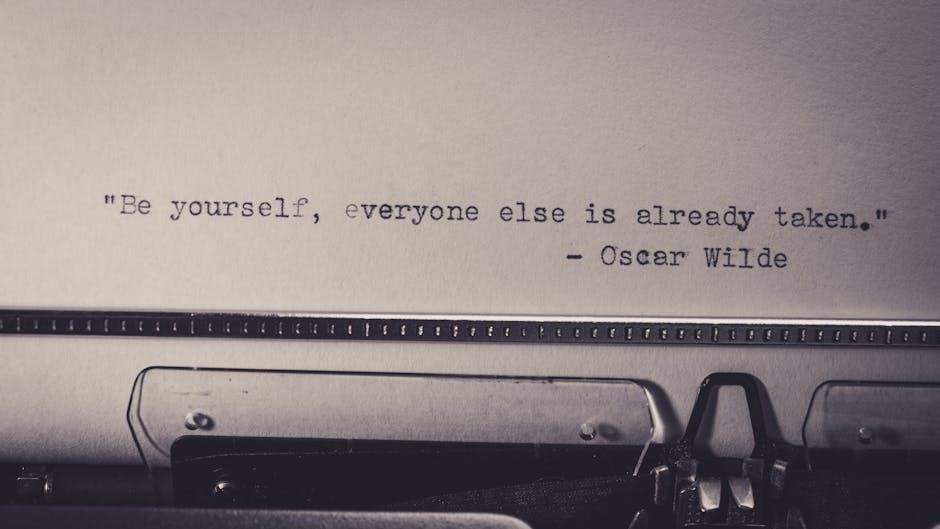“Everyone’s an Author 4th Edition” is a comprehensive guide designed to empower individuals with the skills to create and communicate effectively in various formats. It emphasizes practical advice for writers, researchers, and students, focusing on clarity, ethics, and digital tools. This edition updates content to reflect modern writing challenges, making it an essential resource for anyone aiming to enhance their authorship skills in today’s fast-paced, technology-driven world.
Overview of the Book
“Everyone’s an Author 4th Edition” is a detailed guide tailored for writers, researchers, and students seeking to refine their communication and authorship skills. The book focuses on the fundamentals of research, writing, and publishing, offering practical advice for producing clear, concise, and ethically sound content. It covers a wide range of topics, including academic integrity, effective communication strategies, and the use of digital tools in modern authorship. The text is designed to cater to diverse audiences, from undergraduates to professionals, providing tools to navigate the complexities of writing in various formats. With updated examples and real-world applications, the book serves as a comprehensive resource for anyone looking to enhance their writing abilities and understand the evolving landscape of authorship in the digital age.
Importance of the 4th Edition
The 4th edition of “Everyone’s an Author” holds significant value due to its updated content and relevance to contemporary writing practices. It addresses the evolving landscape of digital authorship, incorporating new tools and technologies that have become essential for modern writers. The edition includes fresh perspectives on ethical considerations and the impact of social media, providing readers with a comprehensive understanding of current trends. Additionally, it offers new case studies and real-world examples, making complex concepts more accessible. This edition is particularly beneficial for writers and scholars seeking to stay informed about the latest developments in authorship and publishing, ensuring they remain equipped with the skills and knowledge needed in today’s dynamic environment.
Key Features of the Book
“Everyone’s an Author 4th Edition” offers fresh insights and practical advice for writers in the digital age. It provides updated content on research methods, digital tools, and ethical considerations, ensuring readers stay informed about modern authorship practices. The book includes comprehensive coverage of collaboration strategies, formats, and platforms, making it a valuable resource for both academic and professional writing. Key features also include clear explanations of citation styles and copyright laws, with real-world examples that illustrate best practices. The text emphasizes the importance of clarity, conciseness, and audience awareness, offering tips for crafting compelling narratives and presentations. Additionally, it addresses the challenges of multimedia authorship and the integration of visual elements into written work. These features make the book a versatile and essential tool for anyone looking to refine their writing skills and adapt to the evolving demands of communication.

Understanding the Concept of Authorship
Authorship involves creating original content, taking responsibility for ideas, and contributing to knowledge. It requires critical thinking, creativity, and adherence to ethical standards, ensuring credibility and authenticity in work.
Defining Authorship in the Digital Age
In the digital age, authorship has evolved to include diverse forms of content creation, from blogs and social media posts to academic papers and e-books. The rise of digital platforms has democratized publishing, allowing anyone with internet access to share their ideas globally. However, this shift has also introduced challenges, such as determining ownership and credibility in collaborative or crowdsourced content. Authors must now navigate issues like copyright, plagiarism, and the blurring of lines between personal and professional content. The digital age emphasizes the importance of ethical practices, proper citation, and understanding intellectual property rights. Tools like plagiarism checkers and digital watermarking help maintain authenticity, while platforms like GitHub and collaborative writing tools redefine traditional notions of single authorship. Ultimately, digital authorship requires a balance between creativity and responsibility, adapting to the dynamic nature of online content creation.
Evolution of Authorship in Academia

Authorship in academia has undergone significant changes, reflecting shifts in research practices, collaboration, and publication norms. Historically, authorship was often attributed to a single researcher or a small group, but the rise of interdisciplinary and large-scale projects has led to multi-author papers becoming the norm. The digital age has further transformed this landscape, with collaborative tools enabling global cooperation and open-access platforms redefining how research is shared. Today, authorship is increasingly recognized as a collective effort, with contributors acknowledged for specific roles such as data collection, analysis, or writing. Ethical considerations, such as avoiding honorary authorship and ensuring transparency in contributions, have become critical. Additionally, the rise of artificial intelligence and machine learning raises new questions about authorship attribution in academic works. These changes highlight the need for clear guidelines and evolving definitions of what it means to be an author in modern academia.
Role of Authors in Modern Publishing
In modern publishing, authors play a dual role as creators and communicators, leveraging digital tools to produce and disseminate content. With the rise of collaborative platforms, authors often work in teams, contributing to multi-author projects that blend diverse expertise. Open-access publishing has further transformed their role, emphasizing the need to engage with broader audiences beyond academia. Authors are now expected to be active participants in promoting their work, using social media and other channels to enhance visibility and impact. Additionally, ethical responsibilities, such as ensuring originality and proper citation, remain paramount. The integration of artificial intelligence in writing and research has also reshaped authorial responsibilities, prompting discussions about accountability and creativity. As publishing evolves, authors must adapt to these changes while maintaining the integrity and quality of their work, ensuring their contributions remain relevant and meaningful in a rapidly changing landscape.

Accessing “Everyone’s an Author 4th Edition PDF”
To access the 4th edition of “Everyone’s an Author” in PDF format, consider exploring various avenues while respecting copyright laws. Start by searching on Google using specific keywords like “Everyone’s an Author 4th Edition PDF free.” Websites such as PDF Drive and Google Books might offer free downloads, but be cautious of potential malware or outdated versions. Additionally, check online libraries or academic databases like JSTOR or ResearchGate, which may require subscriptions or institutional access. Platforms like Anna’s Archive or LibGen host free books, but be aware of the legal and safety risks. Reaching out to the authors or publishers directly could also be beneficial, as they might provide free access for educational purposes. Consider free trials or preview versions offered by publishers, and visit your local library to borrow the book legally. Exploring open-source alternatives or free courses on platforms like Coursera or edX might offer similar content. Always prioritize legal methods to avoid infringing on copyright laws and protect your device from potential harm.

Legitimate Sources for the PDF
Obtaining “Everyone’s an Author 4th Edition” legally ensures compliance with copyright laws and supports authors. Start by checking the official publisher’s website or online retailers like Amazon or Barnes & Noble, which often provide digital versions. Academic platforms such as JSTOR or ProQuest may offer access through institutional subscriptions. Libraries, both physical and digital, are excellent resources; many provide free or low-cost access to eBooks. Additionally, websites like Google Books or Preview may offer limited free access for preview purposes. Always verify the credibility of the source to avoid unauthorized downloads. Purchasing the book directly from the publisher or authorized sellers guarantees a safe and legal copy. If cost is a barrier, consider reaching out to the publisher for educational discounts or free access programs. Supporting authors through legitimate purchases fosters a culture of respect for intellectual property.
Free Resources for Academic Textbooks
Accessing free academic resources requires careful navigation to ensure legality and ethical practices. Platforms like Project Gutenberg and ManyBooks offer free eBooks, primarily classics, but modern textbooks like “Everyone’s an Author 4th Edition” may not be available due to copyright restrictions. Open Educational Resources (OER) repositories, such as OpenStax and MERLOT, provide free, openly licensed materials, though they may not include this specific title. Libraries often offer free access to digital textbooks through services like OverDrive or Scribd, requiring a valid library membership. Additionally, some authors or publishers share sample chapters or study guides on their websites. Always verify the legitimacy of the source to avoid infringing on copyright laws. If the book is not available for free, consider borrowing it from a library or purchasing it directly to support the author and publisher.
Libraries and Digital Archives
Libraries and digital archives serve as invaluable resources for accessing academic materials like “Everyone’s an Author 4th Edition.” Many public and university libraries offer free access to digital textbooks through platforms like OverDrive or Scribd. These services often require a valid library membership, providing users with legal and ethical access to copyrighted content. Digital archives, such as JSTOR or ProQuest, also host a wide range of academic texts, though access may be limited to institutional subscribers. Additionally, some libraries participate in shared databases, allowing patrons to borrow eBooks or PDFs temporarily. Exploring these options ensures that users can access the material without violating copyright laws. Libraries further support academic integrity by promoting lawful access to educational resources, making them a reliable choice for students and researchers seeking “Everyone’s an Author 4th Edition PDF” or similar texts.

Key Topics Covered in the Book
The book covers research and writing techniques, academic integrity, and effective communication strategies. It provides updated content and examples to help authors navigate modern publishing challenges successfully and ethically.
Research and Writing Techniques
Research and Writing Techniques are central to “Everyone’s an Author 4th Edition,” offering detailed strategies for conducting thorough research and organizing ideas cohesively. The book emphasizes the importance of developing a strong research question, identifying credible sources, and effectively integrating evidence into writing. It provides practical advice on structuring essays, reports, and other academic documents, ensuring clarity and logical flow. Additionally, the guide covers advanced techniques like synthesis and analysis, helping writers to present their findings persuasively. By focusing on both traditional and digital research methods, the book equips authors with versatile skills to excel in diverse writing environments. These techniques are essential for producing high-quality, well-supported work in academia and beyond, making the 4th Edition a valuable resource for writers at all levels.
Academic Integrity and Ethics
Academic Integrity and Ethics are foundational principles explored in “Everyone’s an Author 4th Edition,” providing clear guidelines for maintaining honesty and responsibility in scholarly work. The book emphasizes the importance of proper citation, avoiding plagiarism, and crediting sources appropriately. It discusses ethical dilemmas that may arise during research and writing, offering practical solutions to ensure originality and transparency. The guide also addresses the ethical use of digital resources and collaborative work, highlighting the need for fair representation of others’ ideas. By fostering a deep understanding of academic ethics, the book helps writers build trust and credibility in their work. These principles are essential for upholding the integrity of academic and professional communication, making the 4th Edition a vital resource for ethical authorship in the digital age.
Effective Communication Strategies

Effective communication strategies are crucial for conveying ideas clearly and persuasively, as emphasized in “Everyone’s an Author 4th Edition;” The book highlights the importance of organizing information logically and using language that resonates with the target audience. One approach suggested is breaking down complex topics into key concepts, which can then be effectively communicated. Tools like OneSearch and academic databases help in navigating vast amounts of information, ensuring that the content is relevant and well-supported. Additionally, techniques such as creating flashcards with terms like “keywords” and “aggregators” can aid in memorizing and applying these strategies. By focusing on clarity and precision, writers can avoid information overload and ensure their message is understood. This systematic approach enhances the quality of communication, building credibility and engagement with the audience, and fostering a deeper understanding.

Benefits of Using the 4th Edition
The 4th edition offers updated content, modern examples, and improved clarity, making it highly relevant for contemporary learners. Its structured approach enhances understanding and application of key concepts effectively.
Updated Content and Examples
The 4th edition of “Everyone’s an Author” features revised content that aligns with current academic standards and digital communication trends. The inclusion of fresh examples from diverse fields ensures relevance and accessibility. These updates provide practical insights into modern authorship challenges, helping readers navigate copyright issues, digital publishing, and collaborative writing. Enhanced sections on research ethics and citation formats also support academic integrity. The new content addresses evolving technologies and their impact on authorship, making the book a valuable resource for students and professionals alike. These improvements ensure that readers gain a comprehensive understanding of authorship in today’s dynamic environment.

Improved Structure and Clarity
The 4th edition of “Everyone’s an Author” boasts a refined structure that enhances readability and accessibility. Chapters are now organized into clear, logical sections, making it easier for readers to follow along. Subheadings, bullet points, and visual aids break down complex concepts into digestible parts. This improved layout ensures that key ideas are emphasized, while examples and case studies are more effectively integrated. The updated formatting also minimizes clutter, allowing readers to focus on essential information. These changes make the book more user-friendly, particularly for those new to authorship or academic writing. The clarity of presentation supports better comprehension and retention of the material, making it an invaluable tool for learners at all levels. This edition’s structural enhancements reflect a commitment to meeting the needs of its diverse audience.
Relevance to Contemporary Issues
The 4th edition of “Everyone’s an Author” addresses modern challenges and opportunities in writing and communication. It explores the impact of digital platforms, social media, and multimedia on authorship, equipping readers with practical strategies to navigate these spaces effectively. The book delves into contemporary issues such as combating misinformation, ensuring inclusivity in language, and adapting to evolving audience expectations. By incorporating real-world examples and case studies, it helps writers engage with timely topics like ethical communication, digital collaboration, and the responsible use of technology. This focus on current trends ensures that the content remains highly relevant to today’s writers, making it an indispensable resource for anyone seeking to communicate effectively in a rapidly changing world. The edition’s emphasis on adaptability and innovation underscores its value for authors in diverse fields and contexts.

Challenges in Finding Free Academic Resources
Locating free academic resources like “Everyone’s an Author 4th Edition PDF” can be challenging due to copyright restrictions and ethical considerations surrounding access to paid content.
Copyright Laws and Restrictions
Copyright laws protect intellectual property, including academic texts like “Everyone’s an Author 4th Edition.” Sharing or downloading the book without permission violates these laws, potentially leading to legal consequences. Publishers enforce strict copyright policies to ensure authors and creators receive fair compensation for their work. Accessing copyrighted materials illegally undermines the publishing industry and the efforts of authors. While free resources are appealing, respecting copyright is essential. Legal alternatives, such as purchasing the book or using library access, support ethical practices and ensure the quality of academic content remains high. Always verify the legitimacy of sources to avoid infringing on copyright protections.
Ethical Considerations in Accessing Free Materials
Accessing free materials like “Everyone’s an Author 4th Edition PDF” raises ethical concerns. While seeking affordable resources is understandable, using unauthorized sources violates copyright laws and undermines authors’ and publishers’ efforts. Ethical practices encourage supporting creators by purchasing or borrowing materials legally. Sharing or downloading copyrighted content without permission deprives authors of fair compensation and discourages investment in quality educational resources. Academic integrity and respect for intellectual property are crucial, especially in education. Libraries and legitimate platforms offer affordable access, ensuring ethical standards are maintained. Prioritizing legal and ethical access promotes a fair system for both creators and users, fostering a culture of respect for knowledge and its contributors.
Alternatives to Free PDFs
While searching for free PDFs of “Everyone’s an Author 4th Edition” might seem tempting, there are ethical and legal alternatives to access the material. Purchasing the book directly from the publisher or authorized retailers ensures you receive a high-quality, legitimate copy. Libraries often offer free or low-cost access to academic texts, including e-book versions. Additionally, many universities and institutions provide digital archives or subscriptions to educational resources. If cost is a barrier, consider borrowing the book from a library or splitting the cost with a study group. Supporting authors and publishers through legitimate purchases promotes sustainability in academic publishing. Exploring these alternatives not only respects intellectual property rights but also contributes to the ongoing creation of valuable educational content.
“Everyone’s an Author 4th Edition” is a valuable resource for enhancing writing and communication skills. It emphasizes ethical practices and offers practical advice for authors in a digital world.
Final Thoughts on the Book’s Value
“Everyone’s an Author 4th Edition” stands out as a transformative resource for writers, offering practical insights into authorship, communication, and academic integrity. Its updated content addresses contemporary challenges, making it indispensable for students and professionals alike. The book’s emphasis on ethical practices and digital tools ensures readers are well-equipped for modern publishing. With clear explanations and real-world examples, it bridges the gap between theory and application, fostering confidence and competence in writing. Whether refining research techniques or navigating copyright issues, this edition provides a holistic approach to authorship. Its relevance and accessibility make it a must-have guide for anyone seeking to enhance their writing and communication skills in today’s dynamic academic and professional landscape.
Encouraging Legal and Ethical Access
Accessing academic materials like “Everyone’s an Author 4th Edition” through legitimate channels is crucial for upholding ethical standards and respecting intellectual property rights. While free PDFs may be tempting, they often violate copyright laws, potentially harming authors and publishers. Instead, utilizing libraries, digital archives, or purchasing the book ensures legal access and supports the academic community. Many institutions offer affordable options or subscriptions, making it easier to obtain the text responsibly. Encouraging ethical practices fosters a culture of integrity and sustainability in education and publishing. By choosing legal avenues, users contribute to the continued production of high-quality educational resources, benefiting both creators and learners in the long run.
Future of Academic Publishing
The landscape of academic publishing is evolving rapidly, with digital formats and open-access models gaining prominence. As technology advances, authors and publishers are adapting to new ways of disseminating knowledge. Open-access platforms are becoming more popular, allowing broader audiences to access scholarly work while maintaining ethical standards. Libraries and digital archives play a crucial role in this shift, offering affordable and legal access to resources like “Everyone’s an Author 4th Edition”. The future likely holds a balance between traditional publishing and innovative, accessible models that prioritize both intellectual property rights and educational equity. As the demand for free academic resources grows, publishers must find sustainable solutions that uphold copyright laws while ensuring knowledge remains accessible to all.
